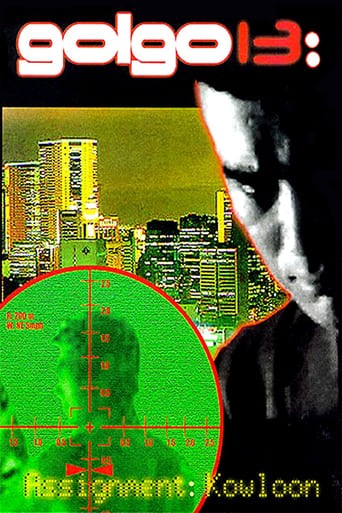seveb-25179
Sonny is in James Bond mode again in this solid but somehow underwhelming entry in the Chiba cannon.
Sonny's character is very intense, but his rage is suppressed, less volcanic and emotional than usual, and he kills from distance with his high powered rifle, rather than up close using his fists, as Chiba fans have become accustomed to seeing (Chiba does Bronson or Eastwood if you will).
However the main problem is that, when the climax arrives, Sonny isn't involved in the real action, he gets to carry out his un-necessarily complicated assassination, but all the hand to hand fighting is left to the Hong Kong police, which is an big let down for hard core Chiba fans.
So it's a decent espionage movie with Sonny Chiba the actor in it, rather than Sonny Chiba the martial arts star.
One interesting cultural moment comes as Sonny is walking back to his hotel down a back alley, when he comes upon a man and woman arguing. The guy begins to slap her around as Sonny approaches. On the one hand, the part of your brain that has watched many Hollywood movies expects our hero to come to her aid, however those who have seen a few of Sonny's movies should know better, he just walks on by.
However when she pulls a gun, shoots and kills the guy, she gets Sonny's attention. He is impresssed and helps her avoid arrest when the cops arrive, by saying she is with him and the shooter went that-a-way.
As Sonny sums it up "The first shot was from anger, the second from fear and the third from love, you didn't want him to suffer".
winner55
Pretty typical Japan crime film of the middle 1970s - fast, cynical, unbelievable, flashy, empty. There are a couple of twists that raise it above the level of mere curiosity. first, Chiba's performance is fine. Second, the film is Japanese, but filmed in Hong Kong, on of the first efforts to cross the great divide between China and Japan that had been rendered and filled with blood during WWII. Interestingly, unlike similar Chinese efforts - e.g., A Man Called Tiger, The Angry Guest/Kung Fu Killers - there's no effort to explore differences between the two cultures: Hong Kong is just another thriving Asian metropolis, much like Tokyo. Perhaps this lack of notice of any difference is the crucial difference - come to think of it, Japanese action films of the 1970s don't have much to say about China in general, or Hong Kong - except to hint that the crime rate is unacceptably high there - which seems a bit churlish since all the professional killers in these films are Japanese. Oh, well.One last historical note - this film clearly had as much impact on John Woo's "The Killer" as Melville's "Le Samourai" - more, I think, since the cop/killer relationship, given crude but important presentation here, is closer to the center of the Woo film than the implicit romance borrowed from the Melville film.Nothing special, but worth a look.
Woodyanders
The almighty Sonny Chiba rules the day as Duke Togo (a.k.a. Golgo 13), a tough, ruthless and formidable consummate professional international assassin who's been hired to rub out a powerful Hong Kong drug lord. Of course, said assignment proves to be easier said than done, as Togo must contend with the drug lord's seemingly limitless legion of flunkies and one Detective Smith (firmly played by Callan Leung), a relentless cop with a personal score to settle with Togo who's bound and determined to arrest him. Director Yukio Noda doesn't miss a trick with this bang-up exciting and absorbing action crime thriller flick: the nonstop lightning fast pace never lets up for a minute, the copious stirring action scenes are staged with considerable rip-snorting brio and finesse (said action includes lots of wild, rousing shoot-outs and the expected brutal, blood-spilling, bone-breaking martial arts mayhem), there's a nice smattering of gratuitous sex and nudity, the exotic globe-trotting locations are colorful and eye-catching, the plot boasts plenty of nifty twists and turns, the tone is appropriately gritty and serious, and both Harumi Ibe's lively, groovy, funky-bumpin' soulful score and Shigeru Akatsuka's agile, dynamic, sumptuously expansive cinematography are on the money slick and effective. A terrifically hard-boiled and ferocious little item that's essential viewing for Sonny Chiba fans.
sixtwentysix
Also known as Golgo 13: Operation Kowloon,(US title) this is a perfect example of a grindhouse cinema Yakuza movie. Before John Woo there were these Yakuza movies. Films that merge the fetish of a slasher film with sex, guns and ammo. Gritty noir that has all of detective work of Chinatown with none of the charm or depth. This is not necessarily a bad thing, it just means that it's a different more lowbrow but equally watchable form of entertainment. Another American example would be Charles Bronson's "The Mechanic" from 1972.As the relentless killer Golgo 13, a hitman that NEVER leaves a job unfinished, Sonny Chiba delivers what I would dare say the most hardboiled of it's time hitman movie. Devoid of mercy and full of bullet holes this movie takes out all of it's aggression on it's viewer with a rapid fire delivery of the plot and action sequences that flow together as if it's own style of dialog.A perfect starter film for anyone interested in grindhouse and kung-fu style movies. Movies like Leon, Kill Bill, Ichi The Killer and later John Woo's The Killer all tip a hat to Chiba's work in this film.


